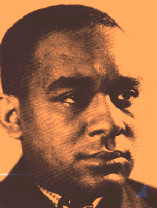David Léon Mandessi Diop was born in 1927 in Bordeaux, France, to a Senegalese father and a Cameroonian mother. During his literary career, he was a proponent of Negritude. This was a political philosophy/literary movement whose scholars included statesman-poet Leopold Sedar Senghor. Negritude was a reaction to the French colonial administrative policy of assimilation; this policy was predicated on the belief that Africans possessed neither culture nor history and therefore French culture could be used to civilise them. Negritude desired a deep and almost essentialist re-grounding of Africans in the history, values, cultures of the Black people, while being open to friendship with other civilisations. The poem below by Diop reflects those values. David Diop died in an airplane crash in 1960. He was 33.
Africa my Africa
Africa of proud warriors in ancestral Savannahs
Africa of whom my grandmother sings
On the banks of the distant river
I have never known you
But your blood flows in my veins
Your beautiful black blood that irrigates the fields
The blood of your sweat
The sweat of your work
The work of your slavery
Africa, tell me Africa
Is this your back that is unbent
This back that never breaks under the weight of humiliation
This back trembling with red scars
And saying no to the whip under the midday sun?
But a grave voice answers me
Impetuous child that tree, young and strong
That tree over there
Splendidly alone amidst white and faded flowers
That is your Africa springing up anew
springing up patiently, obstinately
Whose fruit bit by bit acquires
The bitter taste of liberty.
Diop's strongest poetic device in this poem is that of personification. He infuses Africa with human qualities, and talks directly to her. He reinforces her humanity with the images of "beautiful black blood... The blood of your sweat.... The sweat of your work ...your back that is unbent ."
Nevertheless, Ansah suggests that this poem is a demonstration of the fact that Diop's 'attitude towards Africa is more realistic than romantic.' [1974: 23]. Therefore, Diop is aware of the necessity of recognising Africa's past, however, he is careful not to bury himself and his imaginings of Africa in that past. On the contrary, he prefers to think of a way to get to a hopeful African future, free of the humiliation of colonisation from Africa's past [Ansah, 1974: 24]. But the overwhelming sense one gets from Diop's literary treatment of Africa in this poem, is a deep and almost unshakeable love for the continent [Rhodes, 1970: 234, 239]. And it is this love which shines through, and which probably makes this poem have such an enduring legacy, across and beyond the continent of Africa. But this love, as exhibited in this poem, is not just about deeply felt emotion, but also individual and generational liberatory action [Mpondo, 1970: 99-100].
So though the Negritude movement seems to have gone to its eternal rest. And the decolonisation movements of the 50s and 60s have borne nothing but dust. Though the postcolonial African governments have been the revolution that ate its own children for breakfast... There are still new love poems to Africa being written and spoken. New African dreams being dreamt. New African decolonial movements. New flowers springing up. New fruits on the trees. May we taste true liberty. May our backs be unbent. For our children. We are forever Africa.
References
Ansah, P. A. V. "Poetry and commitment-the case of David Diop." Universitas 3, no. 3 (1974): 14-31.
Mpondo, Simon. "David Mandessi Diop: An Assessment." Présence africaine 75 (1970): 97-107.
Rhodes, Enid H. "David Diop: poet of passion." L'Esprit Créateur 10, no. 3 (1970): 234-241.
Senghor, Leopold Sedar. "Negritude." Indian Literature 17, no. 1/2 (1974): 269-273.




I appreciate this brief reflection on Africa. I would offer that Negritude has not gone to an internal rest but has been reborn & reincarnated in the Black artistic and political movements that came after it. I